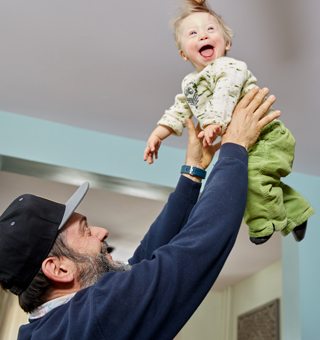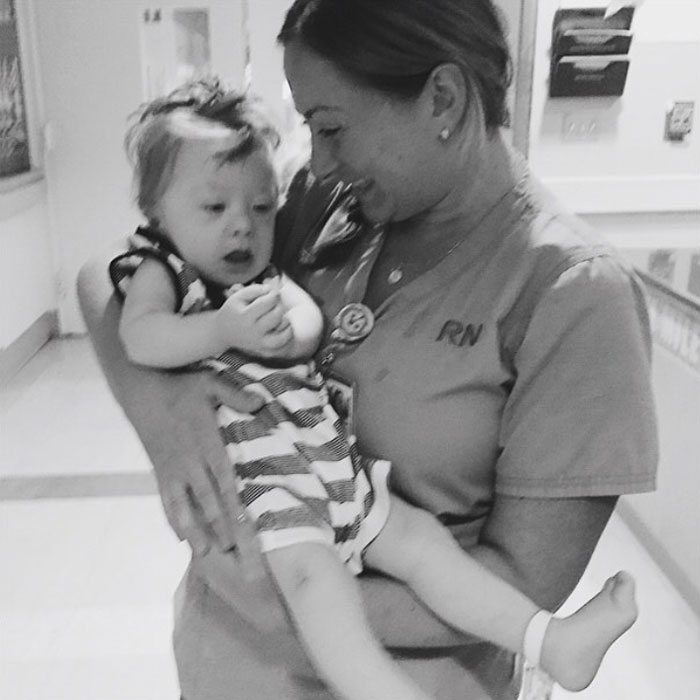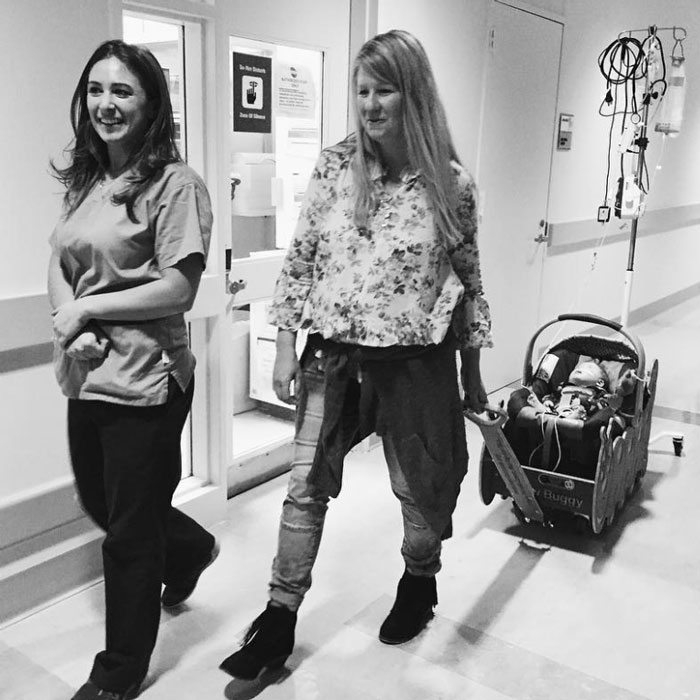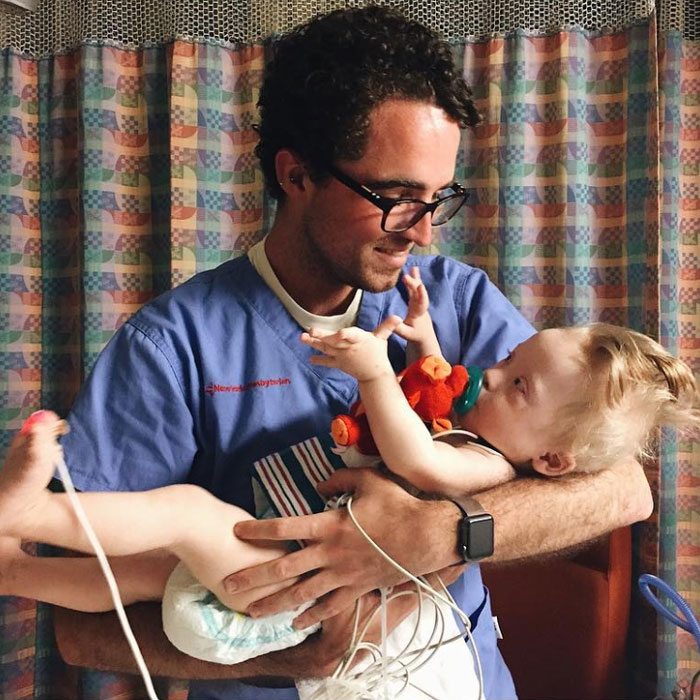When the Hospital Becomes Home: A Newborn’s Six-Month Journey
How a dedicated medical team, family, and friends helped an infant with heart defects and Down syndrome.
As Alissa Baptista reviewed the medical paperwork, after weeks spent traveling countless hours back and forth to the hospital to visit her newborn son, she noticed a detail that jumped out at her.
Her son’s home address was listed as 525 E. 68th St. — NewYork-Presbyterian/Weill Cornell Medical Center, the form said.
“I had to stare at it for a long time,” she says, “because it was right.”
Before Dashiel was born in June 2016, Alissa had expected her son to be hospitalized for two weeks. Because “Dash” had congenital heart defects along with Down syndrome, she wanted him to have the best care — even if it meant driving two hours from her home in the Hudson Valley to NewYork-Presbyterian’s Upper East Side Manhattan campus.
But after Dash underwent surgery to place a shunt into his pulmonary artery, leading to his aorta, to make sure he had enough oxygenated blood going into his lungs, he suffered troubled breathing and dangerously high fevers. Two weeks turned into six months, making the hospital the only home he’d ever known.
For Alissa, the thought of being together as a family of six sometimes felt impossible, with her son in the hospital, her husband working in the city, her three older children at home upstate, and she often on the road in between.
But the family endured their greatest challenges with help from a broad community of caregivers, from the friends and family who watched the kids to the nurses who loved and cared for Dash like Alissa did.
“I feel like they cared for me almost as much as they cared for Dashiel,” Alissa says. “It just gave me peace.”
The Surprising News
Halfway through her pregnancy with Dash, Alissa received news that might devastate many parents: There was a 95 percent chance that Dash would be born with Down syndrome, a genetic disorder that causes lifelong intellectual disabilities and can also cause other medical conditions and abnormalities, including heart defects.
But previous scans showing heart abnormalities suggested Dash could have had DiGeorge syndrome, a rare immunodeficiency disorder that occurs when a small part of chromosome 22 is missing. Symptoms can include heart abnormalities from birth, a cleft palate and distinct facial features, as well as breathing problems and certain autoimmune disorders. Much to her geneticist’s surprise, Alissa reacted to the prognosis with genuine happiness. Alissa was at her children’s ballet class, so she went into the parking lot to take the phone call. The doctor told Alissa that it was unlikely Dash had DiGeorge, but highly likely he had Down’s.
“Hooray for Down’s,” Alissa remembers saying.

“Why would you say that?” the doctor asked, amazed.
The answer was one any hopeful mother could understand. Alissa had long wanted to add another baby to her family, which includes her husband, Cesar; son, Hugo, now 11; and twin daughters, Marlo and Sabine, now 8. But three rounds of intrauterine insemination hadn’t worked as it had for her other children.
Finally, at age 44, Alissa was surprised by her first natural pregnancy with Dash. Although she worried how Down syndrome would make his life difficult, she wouldn’t let the diagnosis detract from her gratitude for a new baby.
“I was truly happy,” Alissa says. “I’ve never heard of a Down’s kid who isn’t happy and doesn’t bring joy into their family’s life.”
Meeting Dash
As her due date approached, Alissa told her kids about the potential problems with Dash and his heart. She asked them to pray that Dash would be born pink and not with blue-tinged skin, which would signal that heart defects were causing a lack of oxygen in his blood.
Marlo and Sabine began scribbling fuchsia drawings of their baby brother.
“Well, Mom, you said he had to be pink,” they later explained.
Knowing that Dash would need surgery soon after birth, the Baptistas decided against delivering their son at a local hospital.
In researching top medical centers, they chose NewYork-Presbyterian Komansky Children’s Hospital at NewYork-Presbyterian/Weill Cornell Medical Center, where Hugo was born and where surgeons specialized in treating the condition Dash had, tetralogy of Fallot, a group of four heart defects affecting 1 in 2,518 babies born each year in the United States.
With Cesar working in New York City during the week, Alissa made arrangements for friends from church to drive her to the hospital. They covered the back seat of the car with plastic in case Dash arrived before they did.
Weighing 8 pounds, 1 ounce, Dash was born on June 20, 2016 — Alissa’s 45th birthday.
Alissa only had time for a quick kiss before he was taken to the neonatal intensive care unit for monitoring.
She spent the night and next morning alternating between happiness and fear, worried about Dash’s heart, his potential challenges, and the uncertain path ahead. When she visited the NICU, she heard something for the first time: “Congratulations.”
One nurse, Tricia Budway, excitedly described the baby Alissa didn’t yet know: how cute he was, how his red hair was standing up. For the first time, Dashiel wasn’t a hospital patient, but Alissa’s son.
“That first day, it was just so important for me to know that Dashiel was OK. And he was adorable and cute and the rest of it didn’t matter,” she says. “He was mine. He was ours.”
It would be a week before she first held her son and nearly a month before the kids would meet the baby brother they had prayed for.
More Complications
Dash was just 8 days old when he underwent his first of two heart surgeries.
With limited blood flow to his lungs, Dash needed more oxygenated blood but wasn’t yet big enough for surgery to repair the heart defects. In the meantime, doctors inserted a shunt — a tube — between his pulmonary artery and aorta to increase blood flow.
The procedure is typically performed through the ribs, but in Dash’s case, surgeons needed to open his chest because of the rare positioning of his aorta.
Dash’s care didn’t get easier from there.
When a blood clot formed in the shunt a week later, Dash needed two stents to widen his shunt. Combined, the shunt and stents provided so much blood flow that his lungs couldn’t inflate on their own.
After a summer spent in the NICU and then the pediatric intensive care unit, where he was sent after his surgery and another two-month stint in the NICU, Dash briefly moved to a rehabilitation hospital closer to home. On October 6, when he began breathing without the assistance of a machine, his health looked so hopeful that Alissa and her daughters were allowed to take him outdoors for the first time in his life — “a mind-blowingly happy afternoon,” Alissa says.
But just three days later, Dash began spiking fevers as high as 106 degrees, landing him in yet another hospital’s PICU and, eventually, back at NewYork-Presbyterian.
Dash had been closer than ever to his family’s house in Hudson Valley, only to return to his original “home.”
“There were times when I just wondered, was he really mine or was I going to get him back?” Alissa says. “Did he belong more to the hospital than to me?”
A Community of Caregivers
Every day Dash spent in the hospital left Alissa without at least one of her children.
Torn between home and the hospital, she visited Dash every other day. After breakfast with the kids, she’d arrive at NewYork-Presbyterian around noon and stay until the evening shift change, returning home just in time to say goodnight.
Whenever Alissa was at one home, caregivers stepped in at the other.
Alissa’s mother and mother-in-law accompanied her on hospital trips while Cesar was working, and her sister left her own kids to spend a month with the Baptistas.
Friends from church and the kids’ ballet school cared for Hugo, Marlo, and Sabine, cooking meals and sending donations for gas and groceries.
Alissa didn’t even have to request help: Church members simply asked which days she was visiting the hospital and coordinated schedules accordingly, ensuring there were always cookies on the counter and casseroles in the refrigerator.
Even Hugo, Marlo, and Sabine did their part to contribute, adapting to new schedules and drawing pictures for a brother they knew mostly in photos.
“I kept expecting that someone would throw a fit and say, ‘Why is it for Dashiel? Why isn’t it for me?’” Alissa says. “But I have never heard that from them, not once.”
The hospital staff, too, went out of their way to support the family.
“I feel like they cared for me almost as much as they cared for Dashiel. It just gave me peace.”— Alissa Baptista
Employees ranging from the parking attendants to the cleaning staff asked Alissa how she and Dash were doing, helping to comfort her in a place where every day brought uncertainty.
“It’s a special group over there,” Cesar says, “especially the nursing staff. The people who are, hour after hour, bedside, you know, taking care of our Dashiel.”
Nurses, who started a Dash fan club, spent extra time holding and talking to him, knowing he needed the company. Alissa sometimes arrived to find balloons tied to her son’s crib: Nurses would relocate them from the rooms of departing patients, thinking Dash would enjoy a new view.
Nurse Danielle Burpee even took Dash out on a “joyride.”
“He was maybe 3 or 4 months; he hadn’t been out of bed in a while,” Burpee recalls. “I put his car seat in one of the wagons [with] a transport monitor … I had him buckled in his little car seat and wheeled him around the unit. I’ll never forget Mom’s face. She said, ‘This is the first time we’ve left the room in, like, two months.’ It just really touched me … the simplest thing.”
Another nurse in the PICU, Samuel Taylor-D’Ambrosio, says tending to Alissa was a priority for them too.
“We would go to visit Dash,” he says, “but we’d also go visit Alissa and hear about how her other kids were doing. … You kind of become a unit after a while. It’s like a familiar face that you see every day.”
“They were so good to [Dash], but they were so good to me too,” Alissa says. “It wasn’t just us. It was just part of who they were.”
Home at Last
On December 15, 2016, Dash finally traded the hospital for his real home. Nearly six months after his birth, his breathing had stabilized and fevers had subsided, thanks to a medicine allergy diagnosis that occurred after a mom, who followed Alissa on Instagram, suggested a diuretic could be the cause of the fevers.
Determined to have the moment most mothers experience with their newborns, Alissa left NewYork-Presbyterian in a wheelchair, holding her baby.
“I waved like I was Miss America to anyone who would look at me,” she says.
Dash hasn’t been hospitalized since his first birthday in June 2017, when he underwent a second open-heart surgery to repair the tetralogy of Fallot defects. While he’ll need ongoing medical care and might require another surgery around age 8 to 10, his overall prognosis is excellent, according to Dr. Emile Bacha, director of pediatric cardiac surgery at NewYork-Presbyterian Morgan Stanley Children’s Hospital and NewYork-Presbyterian/Weill Cornell Medical Center, and chief of the division of cardiac, thoracic, and vascular surgery at NewYork-Presbyterian/Columbia University Irving Medical Center. “Dash’s cardiac diagnosis was very complex and unusual,” says Dr. Bacha. “He has pulled through with flying colors.”
These days, Dash is a healthy 20-month-old who is crawling everywhere but likes being cuddled too. He always seems happy and still has a spike of strawberry-blond hair.
Hugo, Marlo, and Sabine argue over who gets to spend more time with Dash, wanting to hold him, feed him, read stories, and make him laugh.
“Seeing and watching all of Dashiel’s therapists and learning what we should do with Dashiel is great because we need to help Mom with those things,” says big sister Sabine. “If she asks for a diaper, no matter if we want to or not, we should go straight for the diaper or wipes — whatever Mom wants for us to get to Dashiel.”
“It’s just fun making him laugh,” says Hugo, “mostly because he has the biggest smile I’ve ever seen.”
“I love that I can make him smile and play with him,” adds Marlo, “and I can hold him and feed him.”
When the family plays music for Dash, all three of his siblings sing along.
“It’s hard to get kids to agree about anything,” Cesar says, “but they can all agree that Dash is No. 1.”
The Baptistas couldn’t have imagined how long it would take to become a family of six. But having endured so much uncertainty, fear, and time apart, Alissa knows Dash is the child they always wanted.
“We were happy before, but our family was missing him,” she says. “He was supposed to be with us.”




